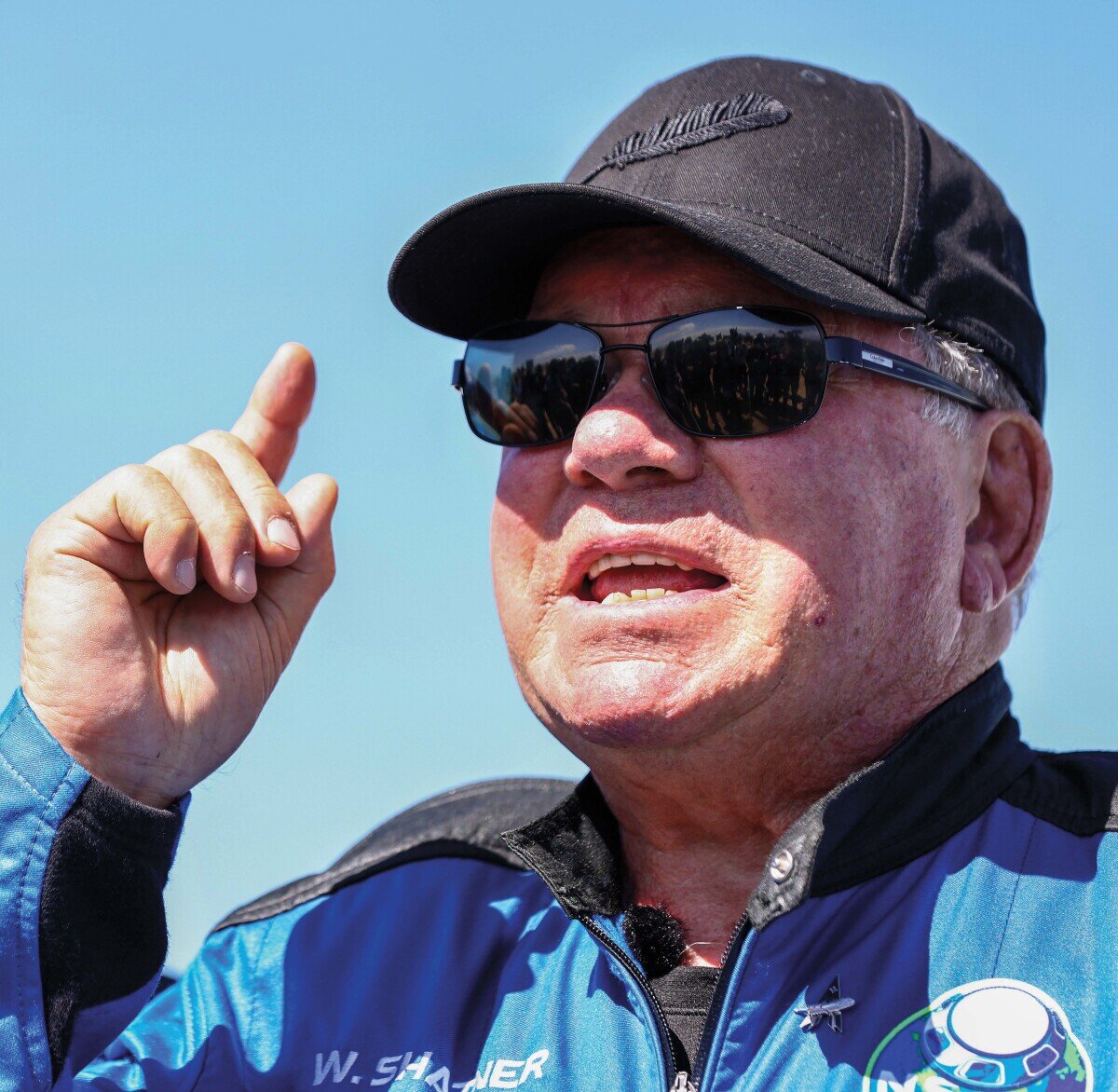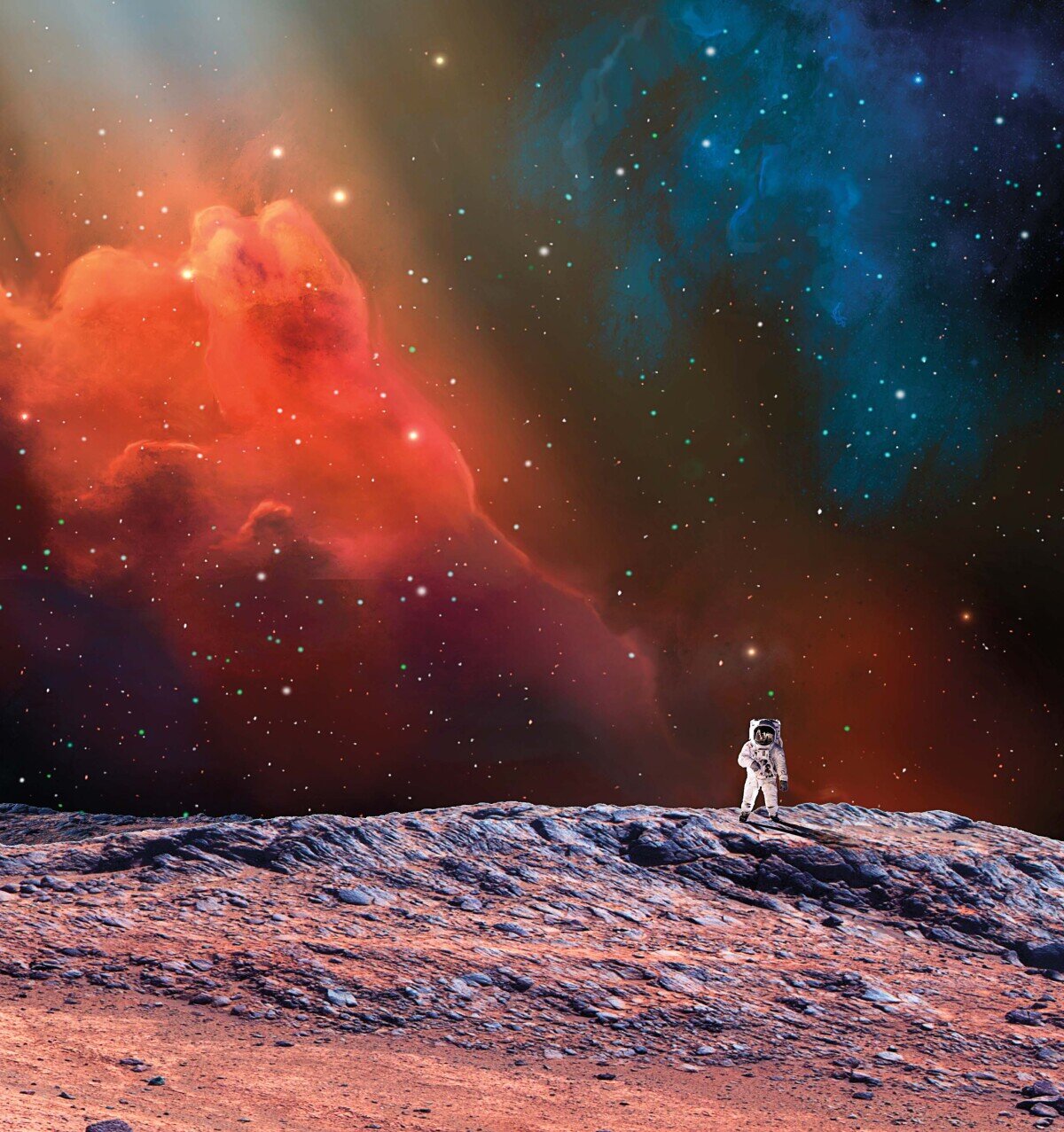Want to Go to Space?
Imagine a world where joyrides into space are as accessible to regular civilians as air travel. Imagine everyday orbits around Earth from hundreds of miles above the atmosphere, life aboard space stations, and forays to the moon or even Mars. That science-fiction world is lurching toward reality in a renaissance of space travel.
Since the first human space flights in the 1960s, only about 560 human beings have ever entered space, almost all of whom were astronauts for national government agencies. But in the early 2000s, a few billionaires founded private space companies, and this summer, they launched themselves and a handful of other non-astronauts into the heavens.
Their success is a fascinating contrast with what is happening here on the ground, where many are feeling claustrophobic being covered with masks, locked in their homes, stripped of their jobs, and deprived of their freedoms. Reaching space seems like the ultimate ambition in a quest for inspiration and liberty.
Why are people so fascinated with space? What are they trying to accomplish? Is this actually just a fantastic waste of time and resources, like many people think, or is there something noble and worthwhile about such feats?
Pioneering Spirit
On July 11, Richard Branson took off in vss Unity, a rocket-powered suborbital space plane in Virgin Galactic’s first fully crewed, 90-minute flight. Detaching from mother ship vms Eve, the plane rocketed to an apogee of 53.5 miles. Branson and the rest of the crew floated through the cabin in microgravity, shouting with excitement. It was the first time an independent spaceflight company put a civilian into space.
Nine days later, Jeff Bezos blasted into space with his brother, an 82-year-old woman and an 18-year-old student, who were the oldest and youngest human beings to reach space. The automated capsule took them to a peak of 66.5 miles and returned them to Earth in a blazing span of 10 minutes.
On September 16, Elon Musk’s SpaceX sent four citizens all the way into orbit in another historical first. The Inspiration4 mission aboard a Falcon 9 lasted three days and flew 364 miles above Earth’s surface, more than 100 miles higher than the International Space Station. The passengers splashed down in the Atlantic Ocean after circling the Earth every 96 minutes.
These are exciting feats. These wealthy visionaries pushed the bounds of what a private company could do and turned dreams into reality. They are exploring new frontiers, even personally. This is the spirit that the great explorers of history have had, driving into the unknown, across the prairies, the oceans, the glaciers, the sky and now space.
Now these men want to make space travel experiences available for paying customers. Hundreds of people have already signed up to buy pricey tickets to see the edge of space.
Safeguarding Humanity?
“Earth, in all its beauty, is just our starting place.” That’s Blue Origin’s summary of its motivation for pouring so much into space exploration. What exactly is motivating these efforts to expand man’s boundaries into the heavens?
“Mr. Bezos’s most extravagant notion, unveiled in 2019, is a vision of space colonies—spinning cylinders floating out there with all kinds of environments,” the New York Times wrote earlier this year. “‘These are very large structures, miles on end, and they hold a million people or more each,’ [Bezos] said, noting they are intended to relieve the stress on Earth and help make it more livable” (February 26).

Musk’s plan is even more ambitious: He wants to land humans on Mars by 2026. Long term, he plans to manufacture 1,000 rockets in nine years to fly 1 million people to Mars. Why? To safeguard human survival.
“Both Musk and Bezos are looking at the long-term survival of the human race—although they have different ideas on how to ensure we survive. Musk sees migration to different planets as top priority, while the Blue Origin owner envisions humanity moving into massive space stations” (Daily Mail, Sept. 28, 2020).
These men see enough threats on Earth that they believe we are in danger of destroying human civilization. They aren’t necessarily ignoring the problems here: For example, Musk also runs a firm that manufactures electric cars, which is meant to alleviate the carbon emissions contributing to supposedly apocalyptic climate change. But they consider it important to have a Plan B in case of an extinction event on Earth.
How inspiring is that vision to you?
Do you want to live in a giant cylinder floating in a black void, raising your children, eating dehydrated concoctions at every meal, knowing that you will never go for a hike or a swim, boat in a lake, drive through the mountains, or see panoramic vistas of wide-open spaces? Think practically about what it would mean to live on a colony constructed on the sub-freezing, unbreathable, barren Martian surface.
It makes you all the more thankful for this gem of a planet we inhabit, glowing, colorful, lush, rich, teeming with life of all kinds.
Earlier this year, in another amazing astrophysical feat, nasa’s Perseverance rover landed on Mars. It has been trundling around ever since, collecting samples to eventually send back to Earth. It’s amazing, but it’s also another example that the more we learn about space, the moon, Mars and beyond, the more we realize how barren and lifeless is everything and everywhere but Earth! There is no life out there.
It is fascinating to imagine floating around in an orbital capsule, looking down at Earth through a window like the four civilian crew members of SpaceX’s Inspiration4 mission were able to do for three days in September. But in the end, you are basically a gerbil in a cage. Three days of that would be plenty: You’d have to know that soon you are coming back to Earth to say, Wow, it’s great to be home!
Asking the Wrong Question
“Why do scientists want to reach Mars?” Trumpet editor in chief Gerald Flurry asked in the May-June issue. “It gets back to one overall question: Is there life there? But they are asking the wrong question! They should ask, ‘Why are Mars and the rest of the universe there?’ This question leads us to the Creator! Scientists are focused on the creation, not the Creator. And though it may be done in ignorance, it amounts to an exercise in futility and rebellion against God.”
All these private and national projects to orbit the Earth, to explore the moon, to reach Mars, to create space stations and colonies to save humanity from killing itself are projects with soaring ambition that is admirable in some ways—but underlying it are fears and rampant faithlessness in the Creator of Earth and mankind.
This is a dazzling example of pitiful human beings trying to solve terrible human problems with misguided human reasoning.
“Some dream of somehow escaping Earth and introducing life to Mars. Can they do that?” Mr. Flurry asked. “Look at what human beings have done to this planet. We are about to destroy all human life on Earth! Even if we ‘escaped,’ we would bring rebellious, destructive human nature with us! Even if we found life on Mars, we would just destroy it in the end!” (ibid).
These are excellent, inarguable points that more people are starting to recognize.
Even these space programs are a good example of human nature at work. nasa requested bids from SpaceX and Blue Origin for building a new lunar lander. Apparently SpaceX bid about half of what Blue Origin bid, so nasa chose SpaceX. Blue Origin sued, which might put the whole program in danger. nasa clapped back, accusing Bezos’s company of prioritizing “its own fortunes over that of nasa, the United States and every person alive today who dreams to see humans exploring worlds beyond our own.”
These are the squabbling people who believe it’s up to them to save humanity inside space cylinders!
The Bible actually reveals that God does have a purpose for all that space, and He actually does intend us to go out there—eventually!
This is a truly inspiring vision of space and the universe that gives us hope for the future survival of mankind. And it is not an idea out of some billionaire’s imagination. It is a genuine plan that is already in advance stages of completion, enacted by the Creator of the universe!
Our Universe Potential
We have a booklet titled Our Awesome Universe Potential that explains this truth from the Bible. I encourage you to order a free copy. We also have a book, written by Herbert W. Armstrong, titled The Incredible Human Potential, that goes into great scriptural detail in proving God’s ultimate plans for the human race. This too is free for the asking. Space is exciting, but not at all for the reasons men like Bezos, Branson and Musk think.
Human beings are laboriously looking for life on other planets, but the Bible reveals that right now physical life exists only one place in the universe—and that is where God specifically put it. You can read about that miraculous process in the first chapter of the Bible, where God renewed the face of the Earth by His Word. This is where He said, Let there be light, and then planted it with beautiful, astonishing life! This planet is extraordinary beyond description.
We are amazed when a rocket goes up 66 miles. But if Earth were the size of a basketball, Jeff Bezos and his fellow passengers would have risen above the surface about 1/20th of an inch. Inspiration4 would have risen less than ½ an inch. Meanwhile, at that scale the moon would be a tennis ball 23 feet away. Mars would be a shot put 21 miles away!

If our entire solar system out to Pluto were shrunk to the size of a quarter, then the Milky Way galaxy would be as big as the western half of the United States!
The center point of our galaxy is about 27,000 light-years from us. For all 200 to 400 billion stars in our galaxy to make one revolution around that point takes about 250 million years! And the universe has some 2 to 3 trillion galaxies like ours.
Yet when the SpaceX capsule landed, the ground crew said, “Welcome back to Planet Earth”—as if they were intergalactic travelers.
These people are taking little pokes out into space, and they believe it is up to them to save humanity!
What they are accomplishing is simply nothing compared to the future God is offering us. Learn about that future!
Elon Musk and Jeff Bezos aren’t going to get you there. But the Creator of the vast universe will. And it gets back to human nature: your attitude. If you will turn to Him, He will lead you to fulfill your incredible human potential! With Him fulfilling His plan for humanity and for you, Earth really is only the starting point. Space is the final frontier—and it is waiting for you.
